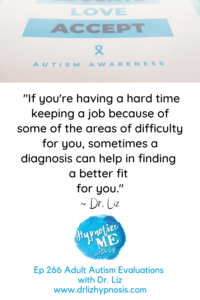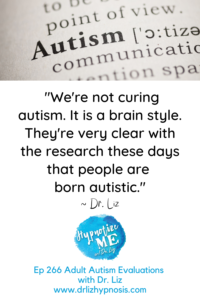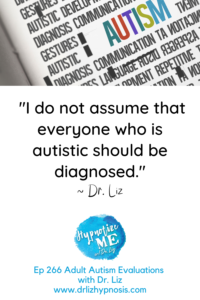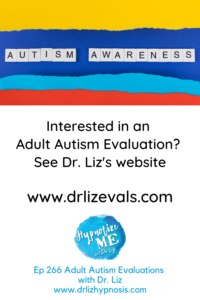There are various reasons why someone may or may NOT seek a formal diagnosis for autism as an adult. Dr. Liz talks about how she got trained to diagnose. And reviews some reasons why someone would or would not want to get assessed and receive a formal diagnosis of autism. She also gives options that people have in determining whether they are autistic with some self-assessments measures.
She also discusses whether hypnosis can help someone who is autistic.
Scroll for Transcript
Websites/Resources Cited:
Dr. Liz’s evaluation website: https://www.drlizevals.com
https://www.aspergerexperts.com
https://www.embrace-autism.com
https://www.additudemag.com (website focusing on ADD/ADHD but with lots of info about ASD as well)
 |  |  |
About Dr. Liz
Winner of numerous awards including Top 100 Moms in Business, Dr. Liz provides psychotherapy, hypnotherapy, and hypnosis to people wanting a fast, easy way to transform all around the world. She has a PhD in Clinical Psychology, is a Licensed Mental Health Counselor (LMHC) and has special certification in Hypnosis and Hypnotherapy. Specialty areas include Anxiety, Insomnia, and Deeper Emotional Healing.
Do you have Chronic Insomnia? Find out more about Dr. Liz’s Better Sleep Program at https://bit.ly/sleepbetterfeelbetter
Search episodes at the Podcast Page http://bit.ly/HM-podcast
Help yourself with Hypnosis Downloads by Dr. Liz! http://bit.ly/HypnosisMP3Downloads
———
A problem shared is a problem halved. In person and Online hypnosis and CBT for healing and transformation. Schedule your free consultation at https://www.drlizhypnosis.com.
Listened to in over 140 countries, Hypnotize Me is the podcast about hypnosis, transformation, and healing. Certified hypnotherapist and Licensed Mental Health Counselor, Dr. Liz Bonet, discusses hypnosis and interviews professionals doing transformational work
Thank you for tuning in! Please subscribe to auto-download new episodes to your listening device.
Transcript:
Hi everyone. Dr. Liz here. It has been a couple of weeks since I put out a podcast episode. I’ve been very regular for years and every other week frequency. But occasionally I fall off of that. So I just considered myself taking a short break in the last couple of weeks.
Today I’m talking about adult autism evaluations and that’s because I’ve begun recently doing them.
If you follow the podcast for a while, you know that my 17-year-old Eva was diagnosed with autism level one about two years ago. In April 2021 and this was quite a shock to the family system, let’s say. Um, not that I hadn’t known that she had struggled in certain areas for years actually, but it never really occurred to me that she was autistic.
I thought it was other stuff going on. Anxiety, her auditory processing disorder, um, some social stuff going on. But when you put all of that together in one picture, it led to the consistency with an autism spectrum disorder. When that happened, I did a real deep dive into the literature, both academic as well as less academic literature, so like books that people had written in perspectives, and I took several courses, both, again, formal for continuing education, which I have to do for my license every year anyway.
As well as informal courses. There’s a website called Asperger Experts. I’ll put the link in the show notes, and it’s run by an autistic man and he just has so many great courses and resources for parents of autistic individuals as well as for artistic individuals themselves. His target audience is really more like young adults, but I just found his stuff so helpful.
So that’s more on the less academic side, although he supports a lot of his stuff by research as well as the more formal training. So eventually all of that led to me being keen on how do I do adult autism evaluations myself as a practitioner.
What I found when I was exploring all these resources is that there seems to be a huge lack of professionals that can do an autism evaluation of an adult.
So there’s plenty for children. Plenty, plenty, plenty, but not that many for adults. So this led me to really look into how do I do it as a professional because I found it very helpful for our family. Very helpful.
Now, there does not seem to be one test for adults. In fact, if you read some of the blog posts and stuff, some adults are, um, what are we going to call this . . . submitted to some of the measures for children, which just feels . . for some of them it feels pretty humiliating actually. And for others, it’s just like, this is ridiculous. Like why am I reading a children’s book, which was meant to assess children when I’m a, you know, 22-year-old adult?
So there doesn’t seem to be one particular, like when you look at diagnosing A D H D, there are some standardized instruments that you can give people and their loved ones, and pretty much it’s like, yeah, you are meeting criteria for A D H D, or no, you’re not.
It’s pretty clear. That does not seem to be the case for autism spectrum disorder. Maybe because you’re really looking at all these different areas of someone’s life, it does tend to be a little bit more complex. But I also believe that it doesn’t exist because it’s been under-researched. But what I did find is that with the combination of instruments and your own clinical knowledge and education that absolutely you can say, okay, someone is consistent with the diagnosis or inconsistent with the diagnosis of autism spectrum disorder.
And one of the big ones that I found in a training that I did take is called the Montero Interview Guidelines for Diagnosing the Autism Spectrum by Marilyn Monterro and Sherry Staal. So this is a structured interview that is particularly useful for adults because you don’t have to adapt, um, an instrument made for children to adult questions. It really does ask about adult functioning, and that training was excellent.
I mean, I am not a fan of live online training. I feel like I’m trapped there, you know, it affects my back because you have to sit for so long. All this stuff. But this training that was led by the, um, creator of the MIGDAS-2, that’s what it’s called for short, was fantastic. She just did such an incredible balance of the online aspects like putting questions in the chat, making sure she answers those as well as the presentation of the slides and the information in giving examples of, okay, what would you do here? What would you do there? And um, I just found it probably one of the best live training sessions I’ve ever taken. My attention was held pretty much the whole time. I mean, obviously it’s a topic that I’m highly interested in and really wanted training in, but I think how she did it too was just really, really good.
Anyway, Back to the diagnosis. So now I do not assume that everyone should be diagnosed who is autistic. So let me see that right here.
Clearly, I do not assume that everyone who is autistic should be diagnosed.
There are some clear reasons not to seek a diagnosis, and some of that is because when you have a diagnosis on your record, then sometimes medical professionals treat you differently. They talk down to you. They don’t take you as seriously and can have some legal implications if you do not have a family who’s safe. Meaning if you have an autism diagnosis and you’re in a really dysfunctional family system, they could use that to hospitalize you or gain control legally of your affairs.
I mean, it could put you in a really terrible position. Sometimes in divorce proceedings, it affects your parental rights. In the past, autistic people have been automatically disqualified for military service. Now I am in a couple of groups with parents, and there’s certainly been some of their kids in there that did go into the military. But I’m pretty sure they had to seek a waiver, which is an additional step to take to be able to do something you want to do if you’d like to be part of the military. Another reason not to seek a diagnosis is that diagnosed autistic individuals are sometimes not allowed to immigrate to many countries.
So if the diagnosis is on their medical record, then they deny them visas. New Zealand denies entry to this day. Australia denies autistic kids visas. So let’s say that you’re a parent who has a job opportunity in Australia and you live in a different country and you have an autistic child, they’ll deny your visa.
You can’t do it. And some of the reason they do that is because they assume that someone with a disability, Is going to be a burden on their healthcare system. So those are some of the practical reasons that someone may not seek an autism diagnosis because it can actually hold you back from doing some things that you want or put you in a precarious legal situation.
One of the financial pieces is that the evaluations are expensive. Typically they rent anywhere from like 1500 to $5,000 is what I’ve seen. I took a look around my area, like how are professionals pricing this in my area to see what people are charging? And that’s about the range that I found. And many practitioners like myself don’t accept insurance.
Since I’m not an insurance, it is a private matter. They can know for themselves, but not necessarily have it as part of their medical record, the diagnosis. And also if they don’t want a whole report written, then that’s less expensive. So the expense is related to two things. One is the time spent with the individual.
Gathering history, talking about what’s going on for them, where are the areas that they struggle with, what areas are easier for them, what kind of issues do they run into? So that’s direct contact with the client, and that’s typically anywhere from two to four hours that I’m actually spending with somebody.
And then there’s the written part. So if someone wants a full report, then you’re looking at another additional, anywhere from like five to 10 hours to write that report. Pretty concentrated time, so that’s why the cost tends to increase. Now, I saw a psychologist in another state offer this, and I offer this as well because I think it’s a really good option for people.
If someone doesn’t want a full report, they really would just like a letter. Great. That’s less money. Because I don’t have to spend five hours writing that report or 10 hours writing that report. A letter is pretty simple, like, yes, you’re consistent with the diagnosis, or no, you’re not. And sometimes what people may do is just want that information for themselves.
Because I don’t take insurance. I do not have to report the diagnosis to an insurance company, which then would add it to someone’s medical record. Someone can choose to do that themselves in various ways, but if they don’t want it added and they just want to know for their own understanding, then that’s an opportunity we have.
Now there are some good reasons to seek a diagnosis that’s more formal. One is that you’re enrolled in university and you need accommodations. This could be extra test-taking time, a note taker, um, not being called on in class, not being required to do presentations where you have to speak in front of a class.
Those are some common accommodations. Perhaps you need accommodations at work. Or you want to access government benefits, so you want to apply for disability. Just a caveat on that, that’s incredibly hard to get with an autism level one diagnosis, level two or three are much more likely to qualify for disability.
Typically level one does not. And again, even with levels two and three, that takes years to get in the US at least. And um, typically a lawyer as well. Now, often with a diagnosis though, you can’t qualify for job training programs in employment help. So that’s something to consider if you’re having a hard time keeping a job because of some of the areas of difficulty for you.
Sometimes a diagnosis can help in the process of finding a better fit for you in terms of employment. For other people, they want to understand where their difficulties are coming from. Perhaps they’ve been bullied at school or by coworkers, perhaps they really struggle with their personal relationships and they want to know like, why am I having these struggles now a diagnosis is not automatically going to fix those for sure.
But let’s say you have a very supportive family or partner, and once they know you’re autistic, then they’re going to do everything they can to support you in that. It can help them learn what you need from them.
Like we have a household that’s pretty quiet anyway because. I fall into the highly sensitive person, and I know there’s some controversy here, about whether that should be considered autistic or not. Um, I do not consider it autistic myself, just stating that HSPs absolutely qualify for that sensory category of the autism criteria. So hands down, typically we qualify for all of those, but because of that, we have a pretty quiet household. It tends to be a good fit for, for both my kids.
But let’s say you have a household that’s always playing the TV and always playing loud music and the acoustics aren’t really good and no one’s made any kind of effort to improve those, and you know that that’s one of the areas that you really need accommodating for you. And once your loved ones know like, oh, you’re autistic, okay, this tends to get overwhelming and overstimulating for you. Like, we’re just going to, you know, tone that down for Thanksgiving, okay? Don’t worry about it. We will watch the football game at a lower volume and not while we’re eating or, you know, something like that, right? We don’t have to play music the whole time. It’s okay. Um, they can begin to adapt in that way. For whatever you need.
You know, a diagnosis may help someone access therapy or support programs. I mean, the availability of these really vary from state to state or city to city. So larger cities tend to offer these types of services, but perhaps you’re in a larger city and you would like to access those then sometimes a diagnosis can help you do that.
There’s so many online resources for people these days as well. The vast majority of them do not require a formal diagnosis. And completely understand why someone would not seek a diagnosis. So speaking of, let’s talk about that for a moment. How would you know you’re autistic without a diagnosis?
Well, there are lots of online resources that you can access and take some screening tests online. There’s a really, really good website called embrace-autism.com. It’s embrace-autism.com. She has assessments on there that have been validated and made sure that they’re reliable and those can give someone an idea.
I use a couple of those in the assessment I do with people, and occasionally someone will score in the autistic range on those. But not meet the criteria. When we look at the full picture of everything that does happen. So I am not the person that’s just going to confirm a diagnosis that someone thinks they have.
I really am trying to look at the whole picture and see, okay, does this fit with autism or not? And the reason you would hire someone is for a more objective opinion. Or perhaps you’re on the border and you’re like, I just don’t know. And I really want to know. That’s a legitimate reason too, to seek an assessment for autism.
But let’s say you take the screeners and you say, yes I am. You don’t need a formal diagnosis to, again, join groups or take that to, let’s say, a therapist who’s going to be able to help you. Um, most therapists will not insist on putting an autism diagnosis in your chart. Um, I, I would say a good therapist will not insist on that. It’s a discussion between you, what you want in your chart, or not. Particularly if, if you’ve never had a formal evaluation, it’s like, okay. The usefulness of that information for them is actually like, how do we help you function better? How do we help you feel better? And how I help someone is going to vary by what they tell me and present to me.
So if someone’s having a lot of meltdowns and outbursts and feels completely misunderstood by a partner, and I know that they’re autistic, I’m going to handle that a little bit differently than, let’s say, similar things happening in their ADHD or similar things are happening and they’re going through a grief process like someone close to them just died.
We’re talking about different things. We’re working on different tools. So I think it is informative. If you have a suspicion and you take some of the online tests and you want to take that to a therapist, I think with a good therapist, I can only help you like, oh, okay, this is what’s going on here. Now let’s work on this.
And it’s not necessarily the changes that you have to make. I worked with couples for years and years and years. I was a couple specialist and sometimes I would get someone who really did get overwhelmed and would shut down if the other partner got too loud, let’s say. Now the work there is not on the person shutting down, tolerating the partner, or being loud.
Absolutely not. The work there is, how can the person getting loud really recognize that and get control of themselves or say, Hey, I need to take a break. Or the person who’s being overwhelmed by it saying, Hey, you’re getting a little loud. I’m feeling overwhelmed. Could we take a break or do you think you could speak a little more softly?
And that being a positive process instead of a negative one. Like, I don’t know why my partner is shutting down and leaving the room. It’s like, well, perhaps because you’re yelling at them. You know, like, let’s work on that. Right. So the reason I bring that up is like, look, it’s not all about the autistic person or someone with autistic traits making the changes. Absolutely not. Some of that is about educating their loved ones about what’s going to work for them.
There are some things that we’re not changing here. We know that autism spectrum disorder falls into neuro divergence now. There are all kinds of neurodivergence. In people. It’s not simply autism or not simply ADHD.
There’s a whole range of neurodivergence on the planet, and when you begin to look for that, you will see it. Now, that doesn’t mean that we can’t modify some wiring in the brain, even when someone’s neurodivergent, we can, but we also recognize that there are some limitations to that.
Like I’m never getting used to tags on my clothes. I know that in my fifties, they’ve bothered me my whole life. It’s not going to happen. Now, if someone came up to me and said, I think this will really help you get used to tags in your clothes, I’d say, let me try it. Okay. So I am open to trying things. It’s not like I’m like, nothing’s ever going to help me, so I’m never going to try anything again.
No, but chances are that that’s always going to bother me. There are certain kinds of fabrics I cannot wear. I just can’t do it. Now, if I had to, if I was, um, if that’s all I had to wear, obviously I would do that and I would hope that eventually my brain would adapt. But I would also guess that I’d be pretty miserable during that whole adaptation time, and I can’t guarantee that my brain would adapt to that.
I don’t know. Itchy clothes are itchy clothes. Ugh. So what I’m saying by that is we’re not always necessarily changing the person who is autistic. Absolutely not. We’re looking at how we can better your functioning in a way that works for you, that’s doable, and how can you better communicate to people in your life what you need from them. That’s a whole different goal here.
Right now, I can do evaluations for people who are outside of the US. We’re doing that online, obviously, as well as residents of Florida. I am working on being able to do that for multiple states in the US but right now you have to be a resident of Florida or you have to be in Florida, one of the two.
So if you’re coming here for vacation, then I could do your evaluation, and that’s because of some of the legal things with the licensing. If you want to find out more about how to get an evaluation from me, then you can look at drlizevals.com. Very simple. Drlizevals.com. You know my regular website? Uh, my main website is drlizhypnosis.com, and the one for evals is drlizevals.com.
So pretty easy to remember. And again, I’ll post the links to Asperger experts to embrace autism. Another great website with resources is actually Attitude Magazine, A D D I T U D E, attitude mag.com. They have all kinds of resources for autism as well because there’s an overlap between ASD and ADHD.
There’s autism speaks.org. That’s a really good website for resources as well. So hopefully this helped you understand more about why you would or would not want to seek a diagnosis as a potentially autistic adult.
If you have any questions, please feel free to email me. You can do that through the website, drlizevals.com
You can do that through email. Of course, I have ’em set up for both DrLiz@dr lizevals.com or Dr.liz@drlizhypnosis.com.
Quick question here at the end, people sometimes ask, can hypnosis help someone with autism? And the operative word there is help, depending on what we’re doing. Autism does not exclude someone from being hypnotized, meaning just because someone’s autistic doesn’t mean they can’t be hypnotized or they could be hypnotized.
Autistic people are individuals. And we all have different abilities for hypnosis. We all have different abilities to learn it as a skill. Because it really depends on the individual and it depends what they’re coming in for help with. We’re not curing autism with hypnosis. Let me just be very clear there.
We are not curing autism at all. It is a brain style. They are very clear these days with the research that people are born autistic.
All right people, let’s wrap up here. I’m getting into all kinds of other stuff now. I hope that you are happy and healthy. Peace.







